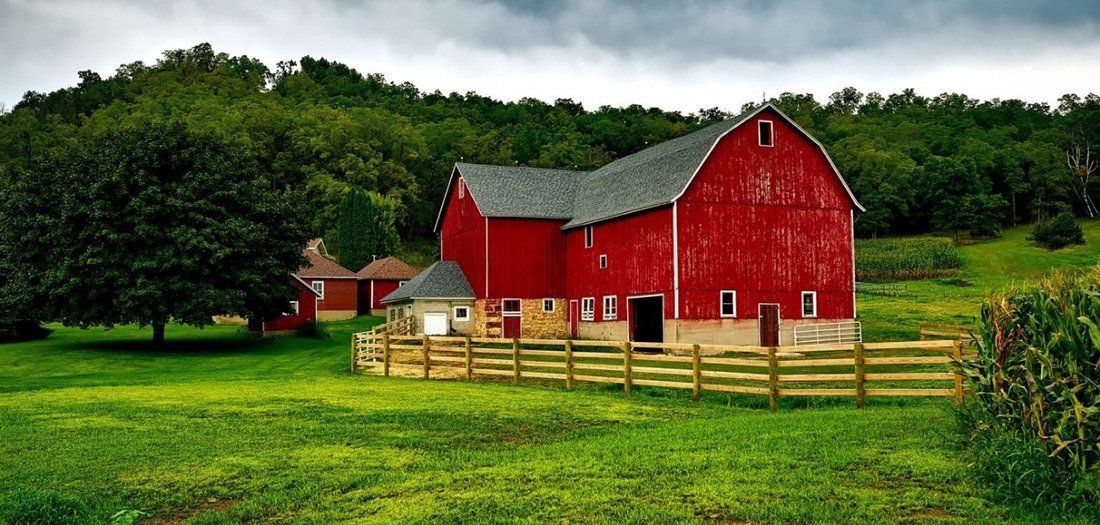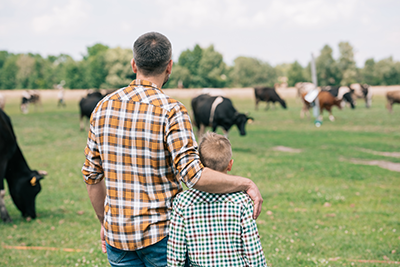 Contact
About Us
Articles
Home
Contact
About Us
Articles
Home

Farms are valuable financial assets, but they may carry even more emotional and sentimental worth. When planning your estate, it’s important to know who among your descendants wants to be involved in operating the family farm. For those who don’t, or can’t, life insurance can be used to equalize inheritances. Life insurance can also provide liquidity for farm operations or to pay for estate taxes.
When is life insurance a useful tool for estates with farms?
There are three main situations involving family farms where life insurance can help with estate planning:
In this situation, some of the heirs want to continue farm operations. Others either don’t want to, or can’t, because they live out of state or other life circumstances prevent this. Without life insurance, this could be a difficult situation.
The farm, as an asset, must pass to the estate upon your death. How will the non-participating heir inherit an equal share? Without a proper plan in place, there may not be enough cash available to make the shares fair. This could lead to acrimony, or even the forced sale of the farm at fire-sale prices.
With the simple expedient of life insurance, this situation is prevented. Using life insurance, you can start with a valuation of the farm assets and allocate that value to the children who will run it after your death.
| Child 1 | Child 2 | Child 3 | |
|---|---|---|---|
| Farm Value | Child 1$250,000 | Child 2$250,000 | Child 3$0 |
| Insurance Proceeds | Child 1$50,000 | Child 2$50,000 | Child 3$300,000 |
| Total Inheritance | Child 1$300,000 | Child 2$300,000 | Child 3$300,000 |
Whatever that amounts to per child, you can get a life insurance policy to pay a similar amount to the non-participating child or children. In the example above, the farm was worth $500,000. Life insurance of $400,000 was used to provide some cash to the farm operating children, and equalize the inheritance for the third, non-farm participating heir.
 A single child may not know whether they want to inherit the farm. Initially, they may feel they’d rather not, but since there are no other siblings to keep the farm in
the family, they might change their mind. In the face of indecision like this, life insurance again makes things easier.
A single child may not know whether they want to inherit the farm. Initially, they may feel they’d rather not, but since there are no other siblings to keep the farm in
the family, they might change their mind. In the face of indecision like this, life insurance again makes things easier.
In this case, equalizing the inheritance isn’t the issue; it’s keeping the farm running. Life insurance in this case can be used to keep the farm running while a final decision is made about the child operating the farm. Also, if the decision is made to sell the farm, the proceeds from the life insurance policy will allow for a sale at advantageous terms, rather than a hasty, fire-sale price because your heir can’t afford to wait.
In this case, none of your heirs are able to operate the farm, but you want to keep it running for the rest of your life. How can life insurance help here? Like the prior example, life insurance proceeds can be used to help pay for farm expenses while it’s being sold. Keeping the farm running smoothly will help ensure that your farm sells for the best possible price, giving your children the largest possible inheritance.
The common theme to each of these scenarios is the need to prevent the sale of the farm under duress, for a low-ball price. In each case, life insurance can be used as a low-cost tool to provide flexibility and more time for your children. Extra time will allow them to make arrangements for the operation of the family farm. This element of time can save not only a larger inheritance for themselves, but bitter feelings and resentment between your surviving heirs.
Besides helping to equalize total inheritance between heirs, life insurance can play a key role in other estate planning areas.
We already mentioned using life insurance to fund farm operations after your passing and prior to the sale of the farm. We’ll dive a little deeper into that scenario here. It may well be that your general plan involves you operating the farm until your reach some age, like 65 or 70. Perhaps your plan calls for selling the farm at that point.
What if you pass away unexpectedly, before you’ve taken any steps to sell the farm? When this happens, your heirs again face the risk of “having” to sell the farm – never a good position from which to get the best possible price.
Life insurance proceeds of even a few hundred thousand dollars can make a big difference. Average operating expenses for a farm can be near $275,000 per year. If you should die suddenly, your heirs may not know how to keep the farm running until a sale is arranged. If you have life insurance in place, though, your heirs could receive hundreds of thousands of dollars within a month or two. With this cash, arrangements can be made to keep the farm running well until an orderly sale can be arranged.
Life insurance can do double duty for your estate planning. In addition to levelling the amount of inheritance, and providing operating cash for the farm, it can help pay for other estate expenses like taxes.
Farming operations are notoriously land rich and cash poor. The “land rich” part of this equation can put your heirs in danger of paying estate taxes, but without the cash resources to pay them. For 2020, the threshold is $11.58 million; estates higher than this amount may be subject to estate taxes.
The minimum federal estate tax rate is 18%, and the maximum is 40%. This could be a painful tax bite for your heirs. Without enough cash in your estate, they might have to sell the farm, and probably not for the best possible price.
Life insurance, though, can cover these costs. If your family plans to keep the farm after your passing, and there is any chance that your farm could be valued near the estate tax limit, life insurance should be a part of your estate plan.
The great thing about life insurance is that if it’s structured properly, it can be very tax efficient. By making sure that you are not the owner of the policy or policies, you can ensure that the life insurance proceeds are not included in your estate. This has several positive consequences, including:
The common theme through these scenarios is that life insurance provides a cushion of cash that at a minimum buys your heirs time to make sound decisions. This time and cash can mean all the difference between your estate plans being executed flawlessly and an emergency fire sale of your cherished family asset.
The key to handling family farms is to have open communication with your potential heirs. Understanding their intentions will help you determine how to structure your estate. Be sure to make these plans known to your financial and estate planning advisors. This will form the basis for determining your life insurance needs.
Once a plan is in place, stick to it, but review it periodically with your advisors and heirs. Make changes as necessary to meet your goals and keep track with your overall estate plans.
Alliance America is an insurance and financial services company. Our financial planners and retirement income certified professionals can assist you in maximizing your retirement resources and help you to achieve your future goals. We have access to an array of products and services, all focused on helping you enjoy the retirement lifestyle you want and deserve. You can request a no-cost, no-obligation consultation by calling (833) 219-6884 today.


